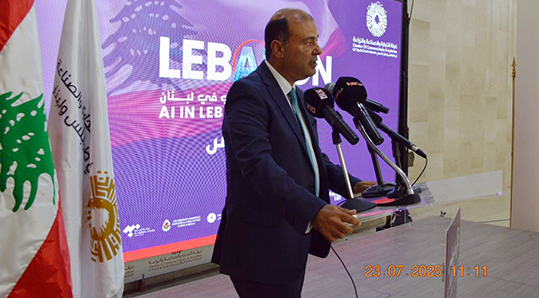Dr. Khaled Hanafy, Secretary General of the Union of Arab Chambers, affirmed during his participation in the “Artificial Intelligence Conference in Lebanon,” held at the Tripoli and North Lebanon Chamber on July 23, 2025, and attended by Lebanon’s Minister of State for Technology and Artificial Intelligence Dr. Kamal Shehadeh, President of the Tripoli and North Lebanon Chamber Tawfiq Dabboussi, Arab League Commissioner Dr. Tareq El Nabulsi, Secretary General of the Arab-French Chamber of Commerce Rayan Kanaan, along with a large number of officials, businesspeople, investors, experts, and specialists in artificial intelligence, that the opportunity today is ripe and well-prepared for establishing a strategic port in the Eastern Mediterranean, specifically in the Tripoli region of Northern Lebanon, which is considered Lebanon’s economic capital and the country’s logistical axis.
This strategic port would be based on a multimodal transport system and a vast logistical hub, relying on artificial intelligence and human intellect, as Lebanon possesses immense human capital. From this perspective, it is essential that all Lebanese parties join forces and cooperate with the Tripoli and North Lebanon Chamber, led by Tawfiq Dabboussi, who possesses the vision and ambition to turn the dream into reality. This would contribute to achieving progress and development, creating job opportunities, and reducing unemployment.
He continued:
“Lebanon, this historic country that has long served as a beacon of thought, culture, and entrepreneurship in the Arab world, still retains—despite the deep political and economic challenges it faces—its true treasure: human capital. Lebanese youth are distinguished by their high competence, mental flexibility, and innate creativity, which has enabled them to excel in innovation and technology fields across the globe. Therefore, what Lebanon needs today is the creation of an enabling environment that fosters innovation: flexible legislation, advanced digital infrastructure, tax incentives for tech investment, and a systematic link between universities and the labor market. Here, the role of chambers of commerce, and the Union that I proudly represent, emerges in supporting such initiatives and directing investments toward building a modern, knowledge-based, and sustainable economy in Lebanon and the region.”
Dr. Khaled Hanafy considered that artificial intelligence is one of the most prominent drivers of the new global economy. It is no longer a luxury or a theoretical concept, but rather a developmental necessity and a compulsory path toward a more efficient, inclusive, and sustainable economy.
Ladies and Gentlemen,
He pointed out that “artificial intelligence represents a new industrial revolution, reshaping value chains, production patterns, consumer behavior, and the nature of jobs. According to estimates from the World Economic Forum, artificial intelligence is expected to contribute more than $15 trillion to the global GDP by 2030. These transformations represent a golden opportunity for the Arab world—if well utilized—as well as a real challenge if we do not keep pace with them through clear policies, robust digital infrastructure, and flexible, learning institutions.”
The Secretary General of the Union stated that some Arab countries have already begun adopting national strategies for artificial intelligence, such as the UAE, Saudi Arabia, Egypt, and Morocco. However, the gap remains in many other countries. Additionally, the private sector—especially small and medium enterprises—still needs more support to transition from being mere technology users to active partners in its development. Therefore, the Union of Arab Chambers is working to integrate artificial intelligence technologies within the chambers’ digital transformation policies, encouraging the creation of partnerships with innovation centers and startups, and coordinating with regional and international organizations to secure funding and build capacities.
Dr. Khaled Hanafy addressed three key points, stating: “The first key point is that artificial intelligence is not a substitute for humans, but rather a tool to enhance human capabilities. Thus, we must place the human being at the heart of any digital strategy—whether through vocational requalification, supporting tech entrepreneurship, or safeguarding ethical values.
The second key point is that artificial intelligence cannot be separated from the legislative environment. As this technology evolves, there is an increasing need for flexible legal frameworks that protect privacy, preserve intellectual property, and prevent discrimination and unfair algorithms.
The third key point reveals that regional cooperation is the optimal path to reducing the digital divide. At the Union, we believe that cooperation among Arab countries—through chambers of commerce, educational institutions, and research centers—is the best way to form an Arab technological bloc capable of competing globally.”
During the conference, it was announced that a 65,000-square-meter plot of land has been allocated for the establishment of an integrated city for artificial intelligence, aimed at enhancing digital transformation and innovation in Lebanon.
Additionally, a 17,000-square-meter plot in the Koura region of Northern Lebanon will be transformed into a sustainable agricultural model based on the latest modern technologies.
Source (Union of Arab Chambers)

